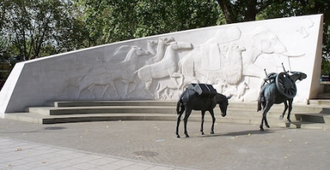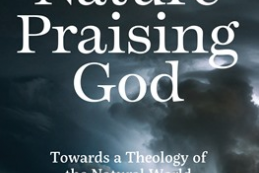War and the wounded Earth

Animals in War memorial, (detail) Hyde Park, London. Wiki Image by Iridescenti
This month, as we remember our war dead, I also recall the animals killed in war. Here in London, near Hyde Park, we have a monument to all the animals that served, suffered and died alongside the British, Commonwealth and Allied forces in the wars and conflicts of the 20th century. Here we learn that an astounding eight million horses and countless mules and donkeys died in the First World War. To this day human and animal bones and pieces of munitions are ploughed up on farmland in France and Belgium where trench warfare once took place.
In fact, the UN has set aside a day to recognise that the natural world is a victim of war and to highlight the importance of protecting it for conflict prevention, peacebuilding, and sustainable development. The UN's International Day for Preventing the Exploitation of the Environment in War and Armed Conflict is celebrated annually on 6 November.
Though humanity has always counted its war casualties in terms of dead and wounded soldiers and civilians, destroyed cities and livelihoods, the environment has often remained the unpublicised victim of war. Water wells have been polluted, crops torched, forests cut down, soils poisoned, and animals killed to gain military advantage. Destructive practices such as illegal mining and illegal logging thrive in conflict zones, further degrading the environment and fuelling instability.
Columban Mission
Columban mission is about responding to the urgent cries of the poor and the Earth, based on the teaching in Pope Francis' environmental encyclical Laudato Si'. "Our missionary identity and spirituality impel us to living intimately with vulnerable people and the wounded earth," says a recent Columban document. Columbans recognise that peace is essential to biodiversity protection and restoration. UN research indicates that even a slight rise in temperature in tropical regions is associated with a 10-20% increase in the risk of armed conflict. This is linked to resource scarcity and competition, especially in areas reliant on agriculture.
The expansion of military presence around the world and the arms industry erodes the culture of peace which Columbans work to cultivate. Billions of dollars are spent on the research and development of more deadly and sophisticated ways of killing people and destroying the environment. In South Korea, for example, Columbans protested the construction of a US-backed military base on Jeju Island, which had many negative impacts on the environment such as destruction of sea-life and water contamination. As members of Pax Christi International, Columbans have long called for the abolition of super-destructive nuclear weapons
At the recent UN international Biodiversity Conference in Colombia (COP16) Columbans were part of a Faiths for Biodiversity coalition which lobbied successfully for a new permanent subsidiary body for Indigenous Peoples, valuing the traditional knowledge of Indigenous peoples, Afro-descendants, and local communities. Care for God's creation and God's people go together.
Impact of Conflict on Creation
On 17 October 2024 the Bishops' Conference of England and Wales organised a webinar titled, 'War and the Wounded Earth: The Impact of Conflict on Creation'. Around 40 participants heard Sr Alessandro Smerilli, Secretary to the Dicastery for Integral Human Development, highlight the destruction and burning of the environment in Iraq and Syria due to war and accompanying water contamination. And the legacy of many wars - landmines - impact agriculture and kill or maim agricultural workers, underlining the sustainability of affected communities. "Humanity has better options than warfare," she said, and urged "building an economy of peace instead of a war economy"
Tim Hill, the Stella Maris CEO in Britain and an army veteran, talked about long term impacts on land and people of Agent Orange and depleted uranium in war and urged more attention to "environmental considerations," in the planning of wars. He lamented that we often overlook war's impact on the environment and highlighted several horrific examples: the US Army's use of Agent Orange in Vietnam War, which has poisoned ecosystems and contaminated land for generations; Kuwaiti oilfields burnt by Iraqi army; and the British army's use of depleted uranium in Iraq and elsewhere. A more recent example is that the Ukraine war has placed the Zaporizhzhia nuclear power plant in Ukraine under siege, highlighting the danger of a radiation leak spreading over the natural world. He asked: shouldn't the Church have a policy against nuclear power because of its inherent dangers to people and environment?
Catholic lecturer Anna Blackman highlighted the commitment of Pope Francis to nonviolence and also his theme of Integral Ecology in his Laudato Si' encyclical. She mentioned that the military sector has lagged behind on monitoring fossil fuel emissions in the light of the climate crisis. Also, that nuclear testing alone has long-lasting impacts as well as the danger of ecological disaster if nuclear weapons were used in war.
Pope Francis has called for "cancellation of war" in his document for 2025 Jubilee Year. He blessed a new Pax Christi Catholic Institute for Nonviolence, opened in Rome on 29 September 2024. Two cardinals spoke at the inauguration - Cardinals Charles Maung Bo, Archbishop of Yangon, and Robert McElroy, Bishop of San Diego. Sr Teresia Wachira, co-president of Pax Christi International and author and researcher Dr Maria Stephan were also on the panel explaining that the Institute will be dedicated to promoting nonviolence as a central teaching of the Catholic Church.
World Peace Day 2025
The Church celebrates World Peace Day on 1 January 2025 and the theme chosen by Pope Francis is 'Forgive us our trespasses: grant us your peace'. This peace includes peace with God's creation. Pope Francis has regularly spoken out against the sale of weapons for profit, describing this as "immoral." The Vatican has appealed for weapons of mass destruction to be eliminated and called for a ban on the development and use of lethal autonomous weapons. Nations are urged to ratify the United Nations Treaty on the Prohibition of Nuclear Weapons and the Comprehensive Nuclear Test Ban Treaty.
This thinking endorses the peacemaking efforts of the United Nations. The UN Secretary General, Catholic António Guterrez, warned in August 2023: "Humanity now confronts a new arms race. Nuclear weapons are being used as tools of coercion. Weapons systems are being upgraded, and placed at the centre of national security strategies, making these devices of death faster, more accurate and stealthier. All this, at a moment when division and mistrust are pulling countries and regions apart." The Church and the UN agree that funds spent on weaponry could be better used to promote the common good of humanity and this includes initiatives to promote environmental sustainability.
Environmental Peacebuilding
The cycle of war is undeniably increasing global greenhouse gas emissions and removing our ability to actively and decisively respond to the Climate and Biodiversity challenges. Columbans support initiatives to reduce military budgets and redirect funding towards social and ecological wellbeing. Prioritising environmental health strengthens the foundations for peacebuilding.
LINKS
'Conflict and Climate Change' is a DVD produced by the Columbans in Britain showing the link between Conflict and Climate Change and how we can respond: www.kevinmayhew.com/products/conflict-and-climate-change-1501412
The 'Jubilee for the Earth' podcast mini-series includes an episode on 'Nonviolence for the Earth', involving Scott Wright, Ellen Teague and Pat Cunningham. www.youtube.com/watch?v=vvAkXptT_D0&t=830s
Ellen Teague runs a Media Desk with the Justice, Peace and Ecology Team in Britain:
https://columbans.co.uk/update/justice-peace/


















